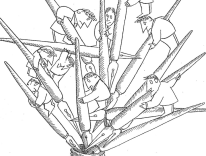Leaders do not operate in a vacuum. When they make strategic adjustments, their opponents do too. President Barack Obama has prompted just such a pivot by Republicans.
They're criticizing him not for the decisions he's made but for the ones he hasn't, and the ones he delayed. They are attacking him not as a liberal ideologue but as a man in full flight from any ideological definition. If they once said his plans were too big, they are now asking if he has any plans at all.
The immediate focus for the new GOP approach is the president's extended deliberations over Libya, with criticism raining down from various points on the GOP spectrum.
Mitt Romney, a likely presidential candidate, issued a string of denunciatory adjectives—"tentative, indecisive, timid and nuanced"—to characterize Obama's Libya policy. (Here's hoping for an explanation of why being "nuanced" about complicated foreign policy choices is such a terrible thing.) Newt Gingrich called the administration "inept."
And many conservative Republicans have joined left-of-center Democrats in asking why the president didn't seek congressional authorization for the Libyan action. "The United States does not have a king's army," said Rep. Roscoe Bartlett (R-Md.).
But Republicans had started shifting their lines of attack against Obama before the controversy over Libya. They did so in response to Obama's own moves since the 2010 election designed to place himself above partisan infighting in Congress and to cast him as a moderate, forward-looking, nonideological voice trying to talk reason to politicians mired in the past's unproductive bickering.
For some time, the president's aides have made the case that Washington is trapped either in squabbles rooted in the politics of the 1930s and '60s, or in battles between "centrists" and "liberals" that animated Democratic Party feuds in the 1980s and '90s.
As a next generation politician, they argue, Obama is untouched by these old quarrels and ready to move the nation beyond them.
The strategy is also an effort to counter the image created during the confrontation over health care that the president had become too much a creature of congressional inside-dealing. As a result, he came to be perceived more as a partisan leader than a national leader.
Obama 2.0 was on display in December when he gave in to Republicans on a two-year extension of former President George W. Bush's tax cuts, including those for the wealthy, in exchange for other measures to stimulate the economy. The president's advisers were gratified to see the resulting rise in his approval ratings.
As the new style took hold, Republicans and conservatives realized that they needed to pull the president down from his Olympian perch and turn his disengagement from Washington's day-to-day struggles into a liability. Thus, Senate Republican Leader Mitch McConnell, in an appearance on Face the Nation early this month, insisted that his party is "prepared to do difficult things" to bring down the deficit, but that the president has been absent. "Where's the president?" McConnell asked then. "Where is the leadership?"
Conservative commentators have also been in full cry against Obama's detachment. "If...you are curious about where the most powerful man in the universe stands on Libya, radiation, a possible government shutdown, the future of Social Security, or rising oil prices," Kimberley Strassel wrote in the Wall Street Journal last Friday, "don't look to the White House. Those issues are tough. Those issues risk mistakes. Those issues might mean unhappy voters."
On his Web site last week, Fox News analyst Dick Morris, writing with Eileen McGann, succinctly summarized the new conservative line: "Obama: From Liberal to Invisible (and Still Too Liberal)."
In the short term, Obama's advisers can point to polls to argue that the president's stand against Washington-style conflict is still benefiting him. A new survey released Wednesday by the Pew Research Center found that 47 percent of registered voters favor Obama's re-election in 2012 while 37 percent prefer a Republican to win. The president's personal favorability rating stood at a healthy 58 percent.
But a 47 percent re-election number is still short of a majority. And with many congressional Democrats restive over when the White House will fully engage on the budget, the GOP's argument about Obama's leadership may begin to win affirmation from his own party. It's hard for a president to remain above the battle, even in a country that claims to despise Washington infighting.
(c) 2011, Washington Post Writers Group


